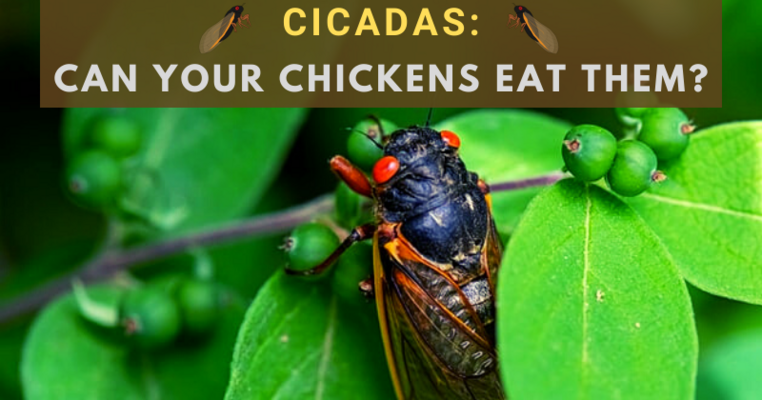Distinguished by protruding eyes, short antennae, and opalescent wings, cicada eyes are set widely apart on their heads. They produce a loud, drum-like sound by clasping and unclasping rapid drum-like tymbals that are similar in appearance to the tymbals of most insect species.
The periodical cicadas (a member of the Magicicada subfamily) are entirely found in North America, where they spend most of their lives underground as nymphs. Typically, they appear after 13 or 17 years. The location and species influence this mostly. Brood X (Ten), which has been underground for 17 years, is expected to emerge in its full force this year.
Chickens & Bugs

It's no secret that chickens are scavengers. They are foragers. They are omnivores. The chickens consume a wide range of insects & worms. In addition to improving egg quality, the high protein bugs and beneficial microbes allow you to reduce the amount of feed you need to purchase. So, do chickens eat cicadas? That's obvious, of course! Cicadas have low fat, no carbohydrates, and high protein content.
Your chickens may love eating cicadas, so if you find yourself encountering lots of them, you can keep them for later use. Fill a freezer bag with them and pop them in the freezer. The chickens will eat them again after they've thawed.
Precautions:
Do you feed your chickens Cicadas? Take part in our exciting poll: Do You Feed Your Chickens Cicadas?
The periodical cicadas (a member of the Magicicada subfamily) are entirely found in North America, where they spend most of their lives underground as nymphs. Typically, they appear after 13 or 17 years. The location and species influence this mostly. Brood X (Ten), which has been underground for 17 years, is expected to emerge in its full force this year.
Chickens & Bugs
It's no secret that chickens are scavengers. They are foragers. They are omnivores. The chickens consume a wide range of insects & worms. In addition to improving egg quality, the high protein bugs and beneficial microbes allow you to reduce the amount of feed you need to purchase. So, do chickens eat cicadas? That's obvious, of course! Cicadas have low fat, no carbohydrates, and high protein content.
Your chickens may love eating cicadas, so if you find yourself encountering lots of them, you can keep them for later use. Fill a freezer bag with them and pop them in the freezer. The chickens will eat them again after they've thawed.
Precautions:
- Almost all chemicals, pesticides, herbicides, and pest poisons are toxic to birds. If you have a coop, run, or any area where your birds roam, you should not use such items. Do not spray bug spray on Cicadas if you dislike them. In the event that the spray doesn't kill the bugs and the chicken ingests the bug, the pesticide could still harm the chicken.
- Grit should be provided to the chickens. Cicadas have fairly hard wings, so they will require grit to digest them well. Even if they free-range, provide a bowl of grit unless you are certain that there are enough small stones for them to play in.
- Fresh, clean water should always be available to your chickens. Those delicious bugs are going to need plenty of water to wash down!
Do you feed your chickens Cicadas? Take part in our exciting poll: Do You Feed Your Chickens Cicadas?

